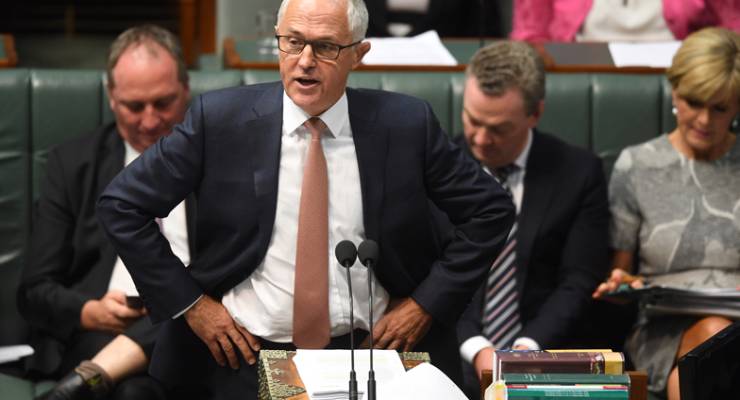
Faced with the challenge of defending the Western Australian Liberals’ decision to do a preference deal with One Nation at the expense of the WA Nationals, the government had a number of options. Declare it was a matter for the WA Liberals. Defend the deal as being all about keeping Labor out of power, a more important objective. Admit that the Turnbull government had made a fundamental break from the position of the Howard government and accept One Nation as a legitimate presence in politics.
Instead, it decided to accuse Labor of, in effect, being as bad as the WA Liberals by benefiting from One Nation votes. Invited to comment on the WA deal in question time, Turnbull was first given cover by Speaker Tony Smith, who ruled the question out of order despite the opposition — which had clearly done its homework — pointing out the question was almost exactly the same as one asked of and answered by John Howard in 2000. When Smith could no longer provide cover, the government’s initial tactic was to claim that Labor MPs Cathy O’Toole (Herbert), Emma McBride (Dobell) and others were elected on One Nation preferences.
As Labor was quick to point out, in both instances — indeed, in every seat where relevant, Labor put One Nation last on its how-to-vote card. Just as it has done for two decades, and just as the Liberals have done for two decades — until now.
Labor MPs did indeed benefit from One Nation preferences in the Queensland seats of Herbert and Longman, at least according to one analysis. In Longman, One Nation preferenced against Wyatt Roy in Labor’s favour. In Herbert, it split preferences. The obvious point is that any benefit to Labor was directed to it by One Nation despite Labor putting it last, or by voters themselves. Candidates are unable to refuse votes depending on their source, unlike in Parliament, where parties can, and have, sent MPs out of the house to avoid benefiting from a “tainted vote”.
Apart from mounting the argument that, in effect, Labor MPs should have declined to take their seats if they received One Nation preferences, the government also argued that accepting the support of the Greens was the equivalent of doing a deal with One Nation, given how “extreme” the Greens are. Of course, that’s undercut by what the government itself has said about the Greens when it has been saved from a difficult legislative spot by Richard Di Natale caving in on issues like Senate reform, the backpacker tax and tax transparency. For example, Malcolm Turnbull: “I want to thank those Senators in the Green Party and the Independent Senator Xenophon and all of my colleagues in the Coalition who stayed up for hours and hours ensuring that this was going to be carried.” Or Turnbull againL “I want to thank Richard Di Natale and the Greens for their support.” Or Barnaby Joyce: “Credit where credit is due. Thanks to the Greens for doing what Labor should have done. #backpackertax “
The government might have been better off taking George Brandis’ approach in the Senate. Brandis stolidly insisted the whole matter was one for the Western Australian Liberals.
Handily for the government — almost as if she was in coalition with them, perhaps — Pauline Hanson then claimed in the Senate that Queensland Labor secretary Evan Moorhead had approached the party on January 25 to propose that, in the words of Hanson, “One Nation to run dead in all Queensland Labor seats and in return Labor would run dead in One Nation strongholds or seats they had no chance of winning” in the Queensland state election, due in the next 12 months. Moorhead, however, has strongly denied Hanson’s claim:
“Absolute crap. I got a phone call asking for preference negotiations, I said no deals”
So someone’s lying. Not that misleading the Senate means anything anymore; even the Leader of Government in the Senate can do it with impunity these days.








I note that the supposed phone call asking for a deal was with James Ashby. How trustworthy.
Indeed. And why address the monkey rather than the organ grinder?
Is Turnbull “losing it”?
No – that would imply he had it, or anything worthwhile, in the first instance.
You’re as bad as any lying politician Keane- claiming Greens “caved in” on Senate Reforms when in fact it was a long term Greens policy that they were pleased the LNP agreed with them on. Never let the facts get in the way of your snark towards the Greens eh?
Hanson is a LNP stooge, she always votes with them.